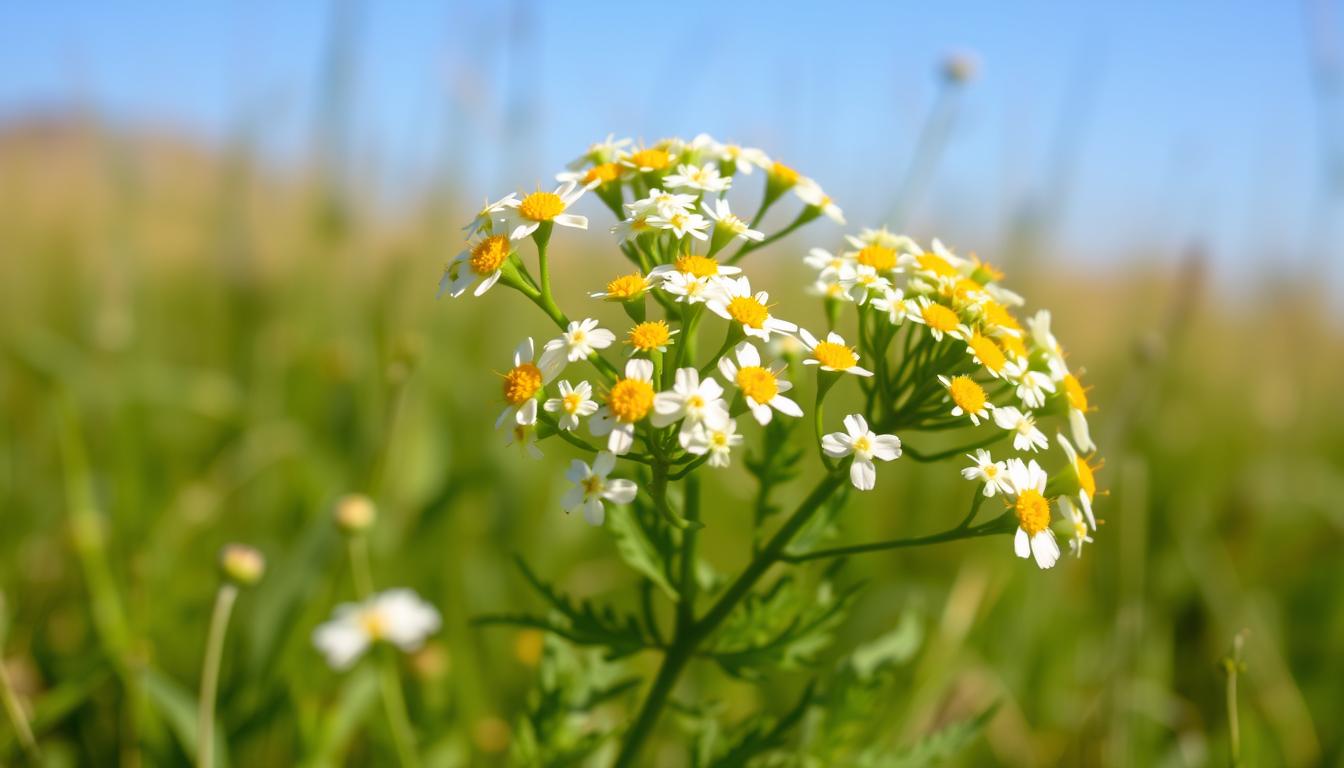When the temperature rises and the body aches, where do you turn for relief? Have you ever thought about the ancient healing power of yarrow (Achillea millefolium)? This simple herb has been used for centuries to fight fevers, reduce swelling, and ease flu and illness symptoms. Learn how this natural wonder can help you fight high temperatures and discomfort.
Key Takeaways
- Yarrow is a powerful herbal remedy known for its anti-inflammatory and antimicrobial properties.
- It can be used to reduce fever, induce sweating, and ease sinus congestion and drainage.
- Yarrow can be consumed as a tea or tincture, or used externally in baths and compresses.
- Combining yarrow with other herbs can enhance its effectiveness in treating various flu and fever-related symptoms.
- Proper dosage and safety considerations are important when using yarrow, especially for children and those with liver conditions.
Understanding Yarrow’s Ancient Healing Legacy
Yarrow, known scientifically as Achillea millefolium, has a long history in medicine. It got its name from the Greek hero Achilles, who used it to heal his soldiers’ wounds. This has made yarrow famous for its ability to reduce fever.
The Legend of Achilles and Yarrow
Achilles’ mother, Thetis, dipped him in the River Styx to protect him. But she missed his heel. An arrow to that heel killed him in the Trojan War. Yarrow was used by Achilles to heal his soldiers, earning it the name “Herba militaris.”
Historical Use in Traditional Medicine
Yarrow has been valued in traditional medicine worldwide. In Europe, it was used for many health issues, like wound healing and digestive problems. People used its flowers, leaves, and stems for their healing powers.
Scientific Background of Achillea Millefolium
Yarrow belongs to the Achillea genus and A. millefolium species. It’s part of the Asteraceae family, which includes asters and sunflowers. It has compounds like flavonoids and terpenes, which help with fever and inflammation.
| Botanical Name | Energetics | Specific Indications |
|---|---|---|
| Achillea spp. | Warm/cool, dry | Irritation, redness, heat, tending towards dryness but with relaxation/lack of tone in the mucus membranes and venous system |
“Yarrow has been referred to as the ‘indispensable blood remedy’ due to its circulatory benefits.”
How Yarrow for Fevers Works in Your Body
Yarrow, also known as staunchwort, wound wort, and knight’s milfoil, is a febrifuge herb with a long history. It’s not just an natural anti-inflammatory. It also has strong antimicrobial properties, making it a great help during fevers.
As a diaphoretic agent, yarrow opens pores and makes you sweat. This is key to breaking fevers. It also helps with sinus infections, wet coughs, and allergies by drying up mucus. This reduces swelling in your nose and throat, giving you natural relief.
Yarrow also has relaxing effects on smooth muscle in your intestine and uterus. This can help with stomach and menstrual cramps caused by viruses.
“Yarrow (Achillea millefolium) is recognized for its versatility and usefulness in various herbal traditions globally.”
Yarrow’s complex makeup, with flavonoids, terpenes, and more, makes it a powerful febrifuge herb. It’s a key part of any natural plan to fight fever.

Yarrow can be used in many ways, like infusions or tinctures. It’s a gentle but effective helper for your body’s natural fever-fighting efforts. It also benefits your respiratory and digestive systems.
Preparing and Using Yarrow as a Fever Reducer
Yarrow (Achillea millefolium) is a trusted herbal remedy for fever. It has a long history in traditional medicine and is backed by scientific studies. Using yarrow to reduce fever is easy and can offer comfort during illness.
Making Yarrow Tea Infusions
To make yarrow tea, use 1 ounce of dried yarrow for every quart of hot water. Let it steep for at least 20 minutes. This ensures the active compounds are fully extracted. Drinking this tea all day can help lower fever and aid in healing.
Proper Dosage Guidelines
- Adults should drink 1-2 cups of yarrow tea daily, in divided doses.
- Children should get their dosage from a healthcare provider, based on age and weight.
- It’s advised not to take yarrow daily for more than two weeks, especially if you have liver issues.
Different Forms of Administration
Yarrow comes in various forms to treat fevers and other health issues. Besides tea, it’s available as dried or fresh herb, capsules, tablets, tinctures, and liquid extracts. For external use, a strong yarrow infusion can be used for baths for infants, children, or those who can’t move.
Always talk to a healthcare provider before using yarrow, especially for children and those with health conditions.

“Yarrow is noted for its anti-inflammatory and antimicrobial properties, making it a valuable natural remedy for supporting the body during fevers and flu symptoms.”
Combining Yarrow with Other Herbs for Enhanced Effects
Yarrow is a versatile herb that helps reduce fever. It works well with other natural remedies to boost its benefits. Mixing yarrow with other herbs can make teas and infusions that help with many health issues.
For example, adding yarrow to a steam bath with eucalyptus can ease sinus and respiratory problems. Yarrow’s cooling effect and eucalyptus’s decongestant properties make a strong team. They help clear airways and make breathing easier during colds or allergies.
Yarrow, mint, and elderflower make a tasty tea that fights flu-like symptoms. Yarrow helps lower fever, mint soothes the throat, and elderflower boosts the immune system.
Yarrow and mullein tea is great for flu-related lung issues or coughs. Mullein helps clear mucus and eases chest pain, working with yarrow.
Yarrow and goldenseal tincture or tea can help with sinus problems caused by allergies. Goldenseal’s anti-inflammatory and antimicrobial effects pair well with yarrow’s ability to reduce inflammation and support the lungs.
For moist colds and flu, try a tea with yarrow, peppermint, elderflowers, mullein, and calendula. This blend offers a soothing and restorative experience.
Exploring how yarrow works with other herbs opens up a world of natural health solutions. Try different mixes to find the best herbal blends for your needs and tastes.
Safety Considerations and Precautions
Yarrow might help lower fever, but safety is key. It could mix badly with some medicines. Some people might react badly to it.
Potential Interactions with Medications
Yarrow can mess with blood-thinning drugs, lithium, and more. If you’re on meds, talk to a doctor first. This is crucial.
Contraindications and Warnings
Pregnant women should not use yarrow. It might harm the baby. Breastfeeding moms should be careful too. People with bleeding issues or plant allergies should also avoid it.
Special Considerations for Children
Yarrow’s safety in kids is not clear. Doctors usually say no to it without checking first. Always ask a pediatrician before giving it to a child.
| Potential Safety Concerns | Precautions |
|---|---|
| Medication Interactions | Consult with a healthcare provider before using yarrow if you’re taking any medications, including blood-thinning drugs, lithium, stomach acid reducers, and high blood pressure medications. |
| Pregnancy and Breastfeeding | Pregnant women should avoid using yarrow, and the safety for breastfeeding women is unknown. |
| Bleeding Disorders and Allergies | Individuals with bleeding disorders or allergies to plants in the aster family may need to avoid yarrow. |
| Use in Children | The use of yarrow in children is not well-studied, and it’s crucial to consult with a pediatrician before administering. |
Yarrow might help with fever, but safety first. Always check with a doctor before trying it. This ensures it’s safe and works well.
Conclusion
Yarrow is a powerful herb with a long history of helping with fevers. It can make you sweat, reduce swelling, and fight off infections. This makes it a great natural remedy for fevers and flu-like symptoms.
But, it’s important to use yarrow carefully. Especially if you’re a child or have health issues. Always talk to a healthcare provider before using it.
Yarrow tea is a safe way to use this herb. It can help lower your fever. You can also mix yarrow with other herbs to make it even more effective.
Remember, always check with a doctor before trying new natural remedies. This includes yarrow for fevers and other herbal treatments.
In short, yarrow for fevers, natural fever reducers, and herbal remedies like yarrow are good options. They offer a gentle way to handle high temperatures and flu symptoms. Knowing about yarrow’s history and science can help you use it wisely in your health routine.

